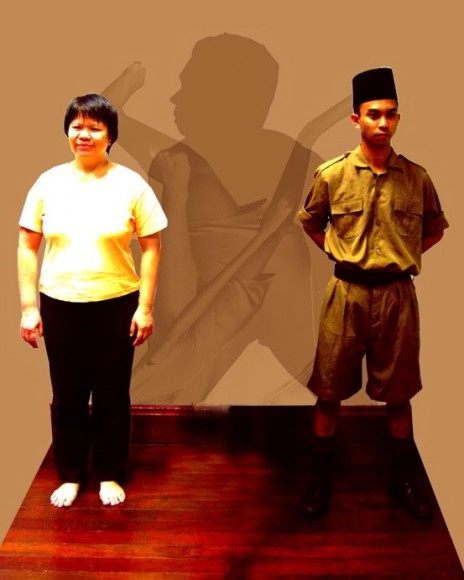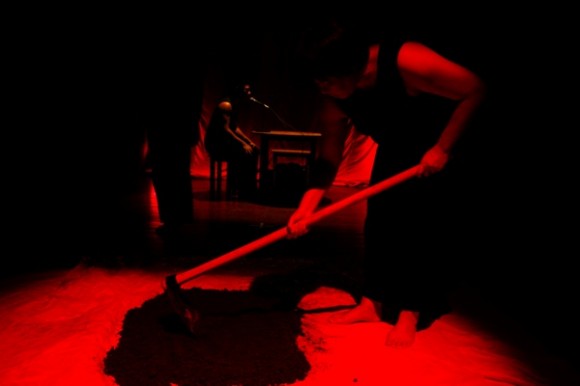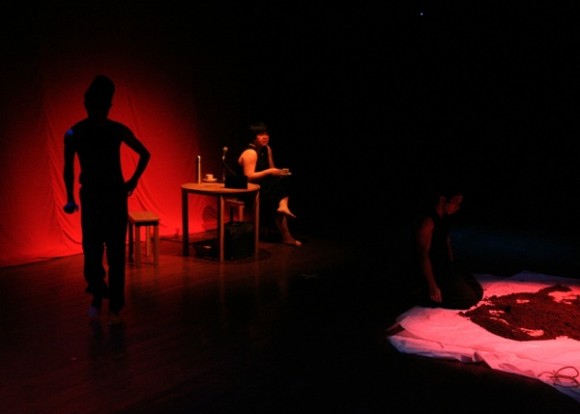


Process-based performance collaboration by Verena Tay and Noor Effendy Ibrahim
Written by Verena Tay
Directed by Noor Effendy Ibrahim
Performed by Verena Tay, Shahril Wahid & Rizman Putra
Venue: The Substation Theatre (Singapore)
Dates: 14 – 16 May 2009
By June Yap
A process-based performance collaboration between writer and performer Verena Tay and interdisciplinary artist Noor Effendy Ibrahim that explores the conflicted sense of belonging and identity of a contemporary Chinese Singaporean woman coming to terms with the fast-changing landscape that she grew up in – the text written on the performance for its publicity material.
Bumiputra (or bumiputera, and wiki-ed originating from the Sanskrit term ‘Bhumiputra’) – literally ‘prince of the soil’, also translated as ‘son of the soil’ and more politically correct, ‘child of the soil’, is a term that finds unlikely partnership with ‘cina’ or Chinese. In a series of twenty-over vignettes the question of what it means to belong, to be rooted in, or tied down to a piece of land is explored with wry humour and at times cutting accuracy. Accuracy at least in the context of a Chinese female in Singapore. Verena’s examination of her own experience, is extended into that of the everywoman, and further questions as well the nature of the relationship of the term ‘bumiputra’ to even those ‘native’ to the crumbly earth with that raw smell that frankly we do not have a very intimate relationship with these days living in boxes in the sky (flats) where soil is found in pots that line the corridor walkway, an attempt possibly on our part to connect with the land, yet one that is frowned upon within housing board regulations that champion regularity and concrete.

The script which was written first in English, had portions translated into Hokkien, Chinese and Malay, with subtitles in English when the non-English parts were spoken, perhaps already indicating then a detachment from ‘origins’ (English being the ‘pragmatic’ decision made by Singapore for it to progress economically and such), and setting the stage for an analysis of what origins and belonging might mean. The questions ‘Are you Singaporean? Are you Bumiputra?’ were repeated at regular intervals, a question less for the characters than its audiences as the performance unfolded.
As pointed out by a member of the audience during the post-show discussion, the term ‘bumiputra’ itself has different connotations in Singapore than say in Malaysia. In Malaysia, the term has more political implications and its qualifications are quite clear – that one is either from one of the ethnic or indigenous groups of Peninsular Malaysia, Sabah or Sarawak, of Malay culture (speaking Bahasa Melayu, now Bahasa Malaysia) and Muslim; whereas its use in the performance is more of a sociological and anthropological nature. The term used in a broader, and perhaps looser, sense here is an attempt to ‘search for the land beneath your feet’ according to the character The Wild One played by Rizman (I think I might be quoting, notes in the dark are not always very clear come the following morning), an anthropomorphism of the land/earth/nature with a mild case of blood-lust.
The question posed here is: how many generations does it take for one to become no longer of migrant stock? Do you have to wait till you are dead and buried? My grandfather was from China, though he lived most of his life here. He may not have been ‘son’ but he is definitely ‘of the soil’ right now. The introduction of the character Lt. Adnan bin Saidi played by Shahril adds an interesting layer to the performance about the implications of belonging – defending what is considered yours – a premise that the local armed forces use for their recruitment drives. Born in Selangor, of Minangkabau descent, and commemorated for his brave defence at the battle at Pasir Panjang against Japanese invaders, the question that is raised with the character is that if you define yourself as part of the land, would you stay and fight? Of course it may also be argued that the two are not necessarily contingent or related; the question that has not been asked here is why must one belong to only one land? Can one not belong to more?

Earth in all its deep, mysterious, dark and organic glory took centrestage in the performance, with each character sweeping, scooping, toiling at it, lying in it or just letting it trickle through cupped hands. Its presence kept the performance and the abstracted observations about belonging grounded. Soil – what seeds would you plant here… The verdict? 4.5 out of 5 chungkols! Digg this!
Sorry, the comment form is closed at this time.
Hi June, thanks for review! hmmm, we must work to bring this performance up to KL la :)
I really like the seemingly oxymoronic title and it does cast the definition of bumiputra in a different light, one that exposes the political aspiration and muscle that shapes this concept of land and identity ownership.
the question that is raised with the character is that if you define yourself as part of the land, would you stay and fight?
I find this particular question relevant to the discussion we had on Zedeck’s entry on Ismail Embong. In the very first picture of the post, we see an anachronistic portrayal of a protest movement in which what has come to be known as the non-bumiputra races exist as non-participatory bystanders.
This apathy (which might not be entirely fictive) structured as non-commitment to an independence struggle creates a discourse of ownership through an act of reclamation. You essentially lose your political will by not being part of this confrontation that is perceivably morally authentic.
Was wondering, how did the actions of the character Lt. Adnan bin Saidi resolve this in the performance?
Hi Simon,
Thanks, I’ll let Verena and Effendy know. The title definitely sets one thinking, including myself.
Lt Adnan’s death occurred before Singapore’s independence, and that he is remembered as a war hero in both Malaysia and Singapore, makes it a particularly interesting addition to the performance in that it shifts our (the audiences) attention to the past and to the birth of nations, its implications and consequences (that are not always as inevitable as we are sometimes led to believe). The question that was raised in the performance in relation to Lt Adnan is that he was fighting for a piece of land that he does not belong to now, but perhaps that he felt he did then. He definitely did not feel apathetic at that time. While this is not actually in the performance, the point is that apathy arises from the belief that one is not, or cannot be, involved, that one is excluded, often as told by others for reasons of these others. The performance does conflate nationalism with the sense of belonging, or plays on the ambiguity, and asks an uncomfortable question – not simply of whether one can be bumiputra cina, but of the assumptions one has to make for the question to even arise.
Hi June and Simon,
I was reading this article with interest. The word that came to my mind was ‘identity’. How do we associate ourselves with one / many places. Are we attached to the land of our birth or by choice. Having lived in Malaysia and Singapore for a number of years, it would be enticing to read into the reactions of audiences with different world views and mind-sets (if this performance was re-created in KL).
The oft discussed topic of bumiputra and non-bumiputra seems like an ongoing saga. I would be interested to read into the apolitical stance of the performance as a new trajectory, or is it performativity?